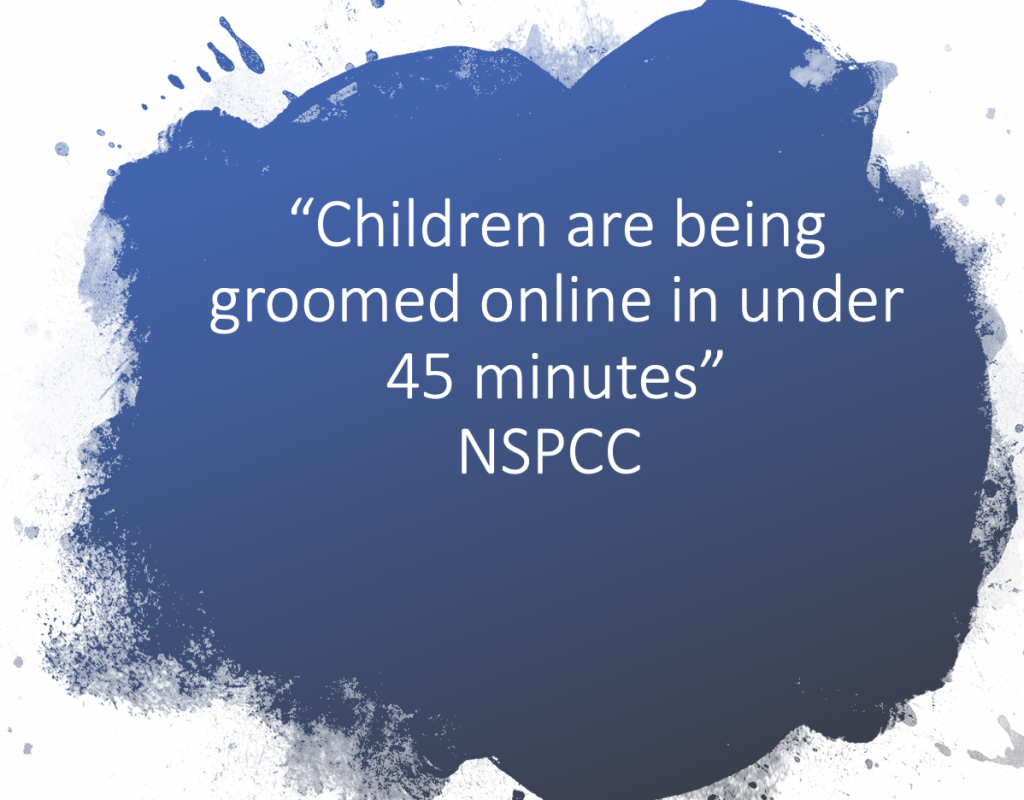- Predators are constantly targeting young people online (boys & girls)
- Online grooming has risen by 266% in the last 2 years
- Groomers target children on social media, multiplayer video games, websites/forums with chat function
- The motive of grooming is usually sexually driven or financial.
Online grooming definition: These are people whose aim is to build trust and befriend a young person online with the aim of sexually or financially exploiting them in the future.
Update 2024:
- More than 200,000 secondary school children may have been groomed online, research by NSPCC suggests.
- A research conducted by NSPCC found that around 4% of young people aged 11 to 17 questioned had sent, received or been asked to send sexual content to an adult when using various sites and apps.
- The charity said that one in 25 children had done so using Snapchat, Facebook or Facebook Messenger; one in 33 using Twitch and Twitter and one in 50 using Instagram and WhatsApp.
The charity has warned that:
Paedophiles contact large numbers of children on social media and then encourage the ones who respond to move over to encrypted messaging or live streaming.
Child grooming story
1. Groomer targets a young person on a Harry Potter Fan Website. Watch the video below:

2. A predator targeting a young girl and things turn sexual very fast.
The BBC reported about a young girl called Emily (name altered for privacy reasons) who was groomed by a 24-year-old man when she was only 13 years old.
She met this man through a friend who claimed that he is only 16 years old. They started chatting on Facebook and Snapchat and texts regularly. Things turn sexual very fast.
They exchanged photos and videos and soon agreed to meet. He picked her up from school one day and drove her into the woods. They had sex and later on kicked her out of the car at the traffic light.
It was the first time she ever had sex. She was bleeding and crying.
Emily’s parents stated to the BBC that they felt like they failed as parents.
“we knew about these social media sites, we thought we were doing everything we could to ensure our children’s safety when they were online, but we still couldn’t protect Emily.”BBC
Online Grooming in the news :
Understanding how Online Predators/Groomers work:
- Online predators can be found on almost all social media apps and online chat rooms, including games (source: New England Journal of Public Policy).
- Online groomers research to determine which apps are most likely to allow them access to their preferred child/teen type. For instance, if a groomer is interested in young males, you will find them in the gaming environment such as Fortnite.
3. They are tech savvy & teen-savvy. Groomers understand the social needs that every child/teen must have (Affection, Belonging, Recognition).
4. Predators will start things off very nicely, flatter your kids and even go the extent of buying them gifts. They make your kids feel like they can relate to them and understand them.
4. They take a lot of effort into learning about your children. For example, stalking your social media profile, knowing who their friend is, where they check in, what their likes and dislikes are. (Source : Common Sense Media)
5. Groomers are deceptive and often lie about their appearance, gender age and location
Once they have gained the trust of your child they will start asking for inappropriate images of them which they will later on use to blackmail them. Also, known as sextortion.
Other facts of online grooming :
- There were over 2,200 counselling sessions with young people who talked in Childline about online sexual abuse online in 2017/18 (source: NSPCC).
- In 2017, the Internet Watch Foundation identified over 78,000 URLs containing child sexual abuse images (source: NSPCC).
Preparing your kids from online predators/groomers :
- Let your kids know that they should walk away from strangers online, especially when someone is being overly nice.
Whether your child uses social media or not, as long as they can access the internet, you need to speak to them about the dangers of talking to strangers online.
2. Regularly ask your child which apps or games they use. Make a rule that they can only chat with people they know and trust in real life. If your child is on any social media app, inspect it regularly.
This is not because you do not trust your kids, but because there are billions of others who will use these platforms to target your kids.
Until they are emotionally equipped to deal with things online, you need to monitor their account.
3. Do not instill fear in your kids; instead, arm them with information.
If your child is big enough, you can show them videos of victims of online grooming so they understand how it can happen.
- If your child is a gamer, then ask them if the game is multiplayer, if they can chat to strangers on the game, and if anyone has ever tried approaching them through the game.
- Spot check your kids’ devices to see if they have any sexy photos. Don’t forget that kids can be good at hiding them using secret apps. If you do find any inappropriate images, do not overreact. Instead, use this chance to have an open conversation about what is going on.
Some more talking points with your children about online grooming :
Let your child be aware that there is always a possibility of someone approaching them online to get access to their personal information, pictures or to even meet up.
They might feel like they can trust the person. Ensure your child that at this point they should not be afraid or hide it from their parents. Instead, they should tell a trusted adult.
Also, talk to your kids about online privacy. For instance, they should never give their personal information such as name, phone number and address to a stranger.
Explain to them about their digital footprint and how sending a sexy image to someone else can have legal consequences if they are below the age of 18 years old.
If you have a daughter remind them if a guy asks for their sexy photos it is not HIS image on the internet but in fact theirs.
Get your kids to start expressing their feelings and help them manage anxiety
What if I think my child is being targeted by a groomer
Firstly, do not panic. Gather all the evidence by taking a screenshot of the messages that have been exchanged.
Talk to your child about how it happened but do not be judgemental and don’t make them feel like it’s their fault. Ensure them that you will keep them safe and the problem will be resolved.
Report the incident to the platform that is being used and take a screenshot of the reporting. Block the person and finally report it to the police so the groomer does not target other kids.
Here are tips to you keep children safe in the digital age :
Tips for Non-Tech Savy Mums :4 tips to digital parenting for non-tech savy mums
Stop kids from being datafied : Are your children datafied from birth
3 dangerous places for children to be online : 3 places kids should have limited internet access
Was this helpful?
Good job! Please give your positive feedback
How could we improve this post? Please Help us.








